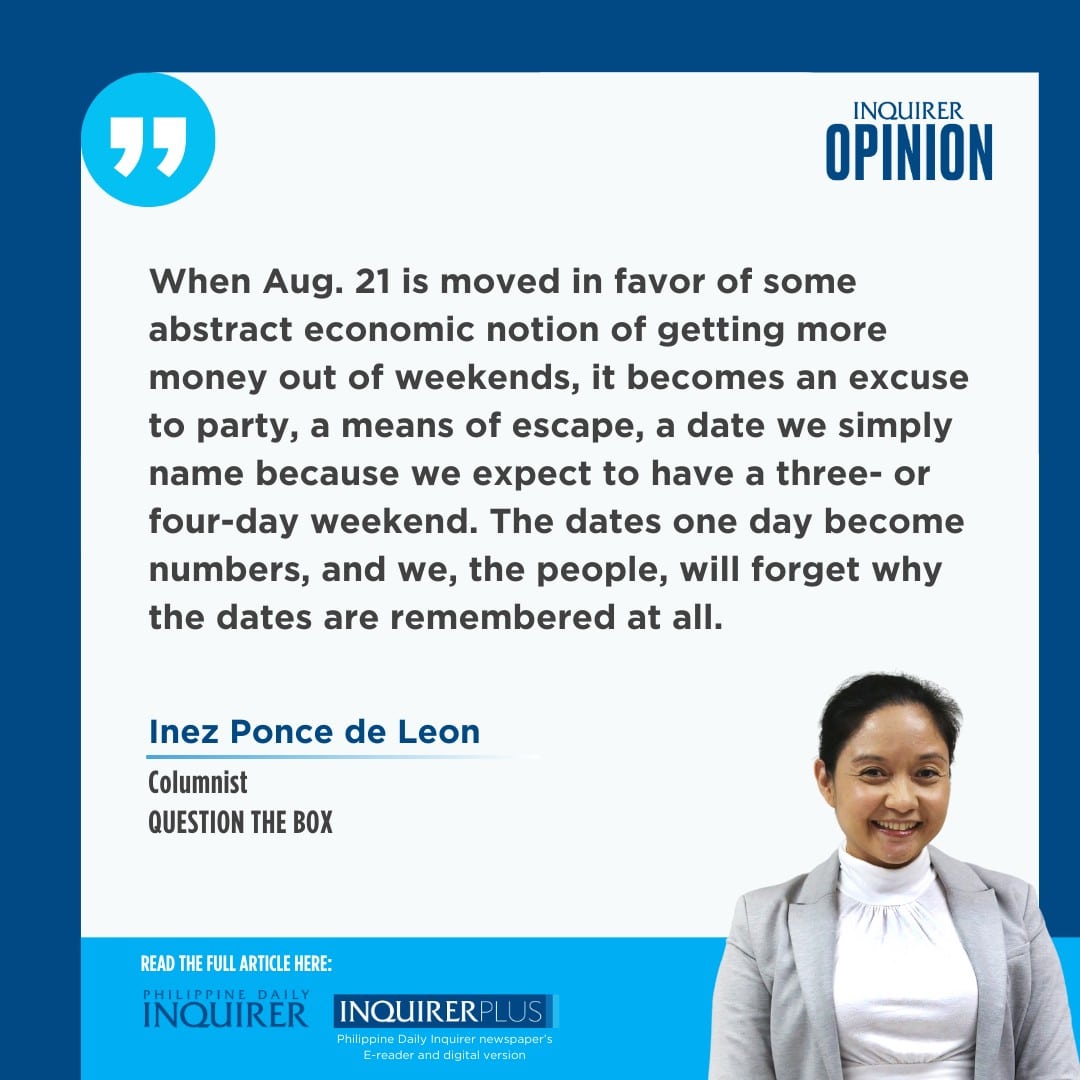Not mere holiday
Today is Aug. 21. Exactly 41 years ago, Sen. Benigno “Ninoy” Aquino Jr. was shot dead as he got off a plane.
It’s easy to write a sentence like this when Aug. 21 becomes a mere moveable holiday that can be shuttled back and forth between long weekends until the commemoration becomes a celebration, and the celebration becomes stupor.
After all, when a commemoration becomes widely known as a holiday, it degrades into a day where our only task is to take a break, spend more time with our families or our hobbies, or catch up on sleep.
Rarely will such a holiday be one for commemoration, where we remember what exactly is being remembered. Then, before long, we forget, the way that those in power want anyone to forget the sins of the corrupt.
Let’s try writing that sentence again.
To do that, we have to look at what the events of Aug. 21 mean. Yes, there was an assassination that led to a snap election, then a bloodless revolution less than three years later. Yes, people fought for their right to be heard and live in safety. Yes, it was a time to march, to demand change, to throw off our shackles and leave our dungeons.
As Dr. Randy David put it in last Sunday’s column (“The significance of Ninoy Aquino’s assassination,” 8/18/24), however, we must also remember why the assassination happened at all, and what it represents in our history.
Ninoy’s death came after years of martial law, where the country was promised progress, but where only the rich, privileged, and connected benefitted. The coffers were drawn dry, those who discovered and reported corruption disappeared, those who questioned the government were tortured. Those who wanted to protest no longer could; so, they hid, in silence.
And those who witnessed it all sometimes simply sat back, blamed activists for speaking their minds, praised what they saw as discipline in their fellow citizens, would later reminisce with both false nostalgia and blind infatuation of the veneer of supposed beauty that hid the true ugliness of poverty, hunger, and death beneath.
That is why we remember Sept. 21 as the date that the presidential proclamation was signed to put the country under martial law, and Sept. 23 as the date that the proclamation was announced. These dates do not move; our historical archives house both the document and the video bearing the exact dates that the events occurred.
We remember martial law because it was a time when we found out what absolute power could do: It could hide injustice, divide families, and destroy lives. It could make otherwise gentle people staunch defenders of a bloody regime. It could turn otherwise reasonable people into bumbling idiots finding excuses to defend their idolatry.
We remember Ninoy’s death because it came after years of people kissing bottoms and licking boots so that they could get a share of the country’s gold, whatever form it took. We remember his death because it unraveled a crumbling system once thought to be singularly loyal, as the business community, military, and statesmen all began to turn their backs on the regime—until finally, the country came to its feet and stood as one.
Aug. 21 is our reminder that we should never be blinded again.
It is a reminder that we should be wary of those who promise absolute solutions to complex problems, those who trot out empty slogans but have no platform to show for their buzzwords, those who reduce the country’s problems to the fault of individual citizens without holding an irresponsible government to account.
When Aug. 21 is moved in favor of some abstract economic notion of getting more money out of weekends, it becomes an excuse to party, a means of escape, a date we simply name because we expect to have a three- or four-day weekend. The dates one day become numbers, and we, the people, will forget why the dates are remembered at all.
We already see it in places where Dec. 25 is an economic powerhouse bursting with sparkles, or where Easter is a Sunday for egg hunts and chocolates. The beaches are full, the malls are packed, the restaurants are overflowing.
In the meantime, the churches that should commemorate the significance of the feasts are empty all year. The so-called followers of the faith lie, cheat, and steal even as they profess to be ardent mass goers.
Both feasts, one set, the other moveable, have largely become holidays, more for money than meaning. It falls to us to understand what the feasts mean, whether or not we celebrate them.
It falls to us to remember that every feast is a way to intimately know history, faith, and belief—not a time to push ourselves away from reality.
And so, we try to write the sentence once again, to undo the stupor, to add solemnity to celebration—to commemorate Aug. 21.
Let it be remembered: exactly 41 years ago today, Sen. Benigno “Ninoy” Aquino Jr. was assassinated upon returning to a country that had long suffered from the oppression of a corrupt regime—a country that he believed was worth fighting for, worth dying for.
Let us be that country again.
—————-
iponcedeleon@ateneo.edu





















